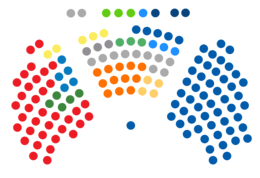Member of Parliament of Croatia
|
Croatian Parliament Hrvatski sabor |
|
|---|---|
 |
|
| Type | |
| Type | |
| Leadership | |
|
Deputy Speakers
|
Milijan Brkić (HDZ)
Siniša Hajdaš Dončić (SDP) Željko Reiner (HDZ) Furio Radin (Ind.) Since 14 October 2016 |
| Structure | |
| Seats | 151 |
 |
|
|
Political groups
|
Government (61) Supported by (16) Opposition (74) |
| Elections | |
|
Party-list proportional representation D'hondt method See Elections in Croatia |
|
|
Last election
|
11 September 2016 |
|
Next election
|
Next Croatian parliamentary election |
| Meeting place | |
 |
|
| Parliament Palace, Zagreb | |
| Website | |
| www.sabor.hr | |
Government (61)
Supported by (16)
Opposition (74)
The Croatian Parliament (Croatian: Hrvatski sabor) or the Sabor is the unicameral representative body of the citizens of the Republic of Croatia; it is Croatia's legislature. Under the terms of the Croatian Constitution, the Sabor represents the people and is vested with legislative power. The Sabor is composed of 151 members elected to a four-year term on the basis of direct, universal and equal suffrage by secret ballot. Seats are allocated according to the Croatian Parliament electoral districts: 140 members of the parliament are elected in multi-seat constituencies, 8 from the minorities and 3 from the Croatian diaspora. The Sabor is presided over by a Speaker, who is assisted by at least one deputy speaker (usually four or five deputies).
The Sabor's powers are defined by the Constitution and they include: defining economic, legal and political relations in Croatia, preservation and use of its heritage and entering into alliances. The Sabor has the right to deploy the Croatian armed forces abroad, and it may restrict some constitutional rights and liberties in wartime or in cases of imminent war or following natural disasters. The Sabor amends the borders of Croatia or the Constitution, enacts legislation, passes the state budget, declares war and decides on cessation of hostilities, adopts parliamentary resolutions and bylaws, adopts long-term national security and defence strategies, implements civil supervision of the armed forces and security services, calls referenda, performs elections and appointments conforming to the constitution and applicable legislation, supervises operations of the Government and other civil services responsible to the parliament, grants amnesty for criminal offences and performs other duties defined by the constitution.
...
Wikipedia
